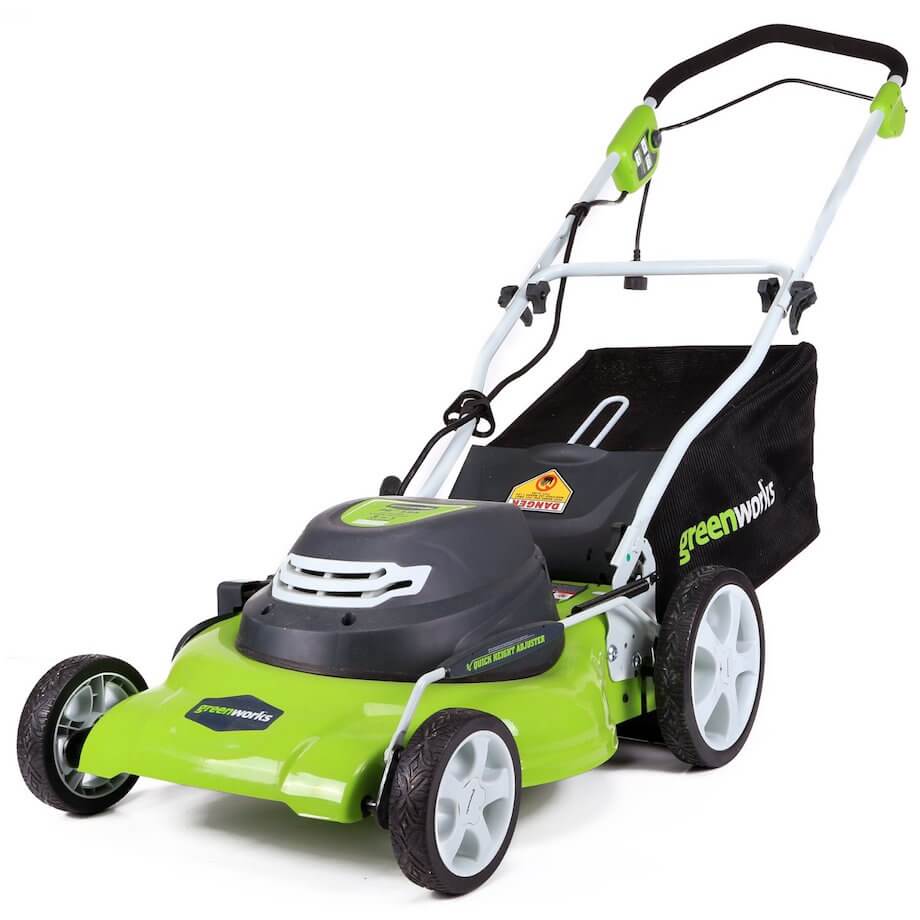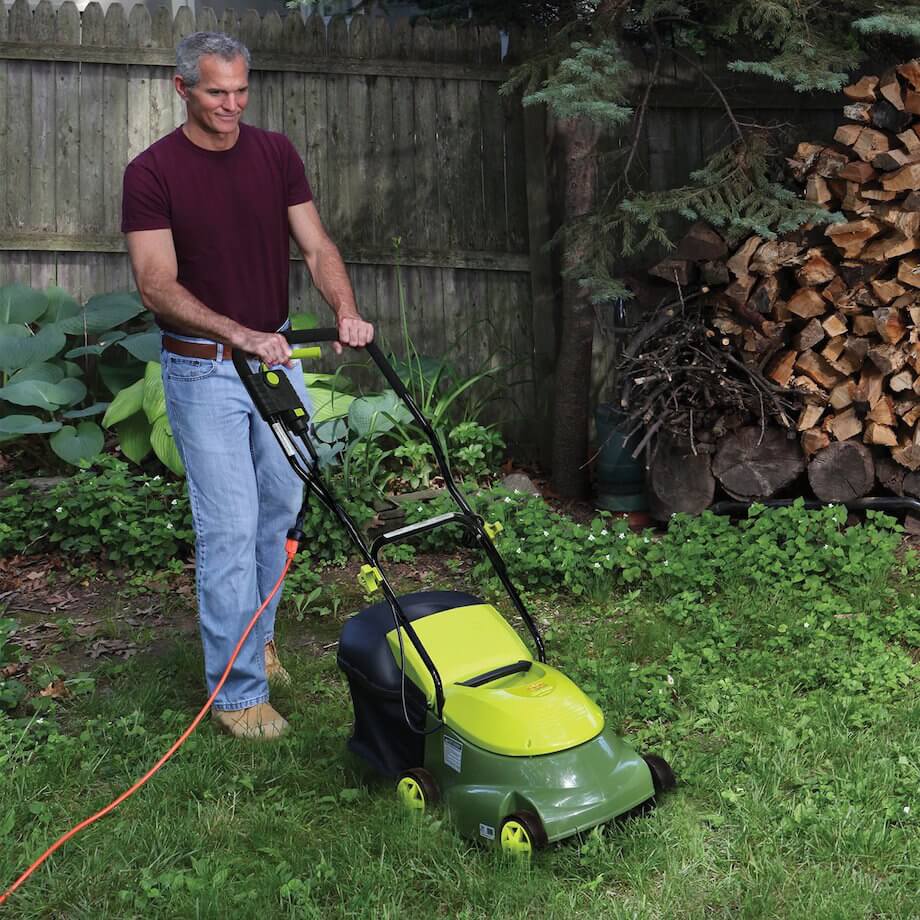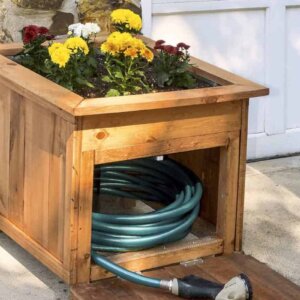A corded electric lawn mower is simply the cheapest, easiest, quietest—and most earth-friendly—option for power mowing your lawn. Yeah, it has a cord, and we’ll talk about that, but first the good news.
Corded Mowers Are Your Least Expensive Electric Lawn Mower Option
Let’s start with price. Corded electric mower prices range from $85-$250, much less than cordless mowers. A corded mower is going to cost substantially less than a similar mower that’s cordless, meaning it has the best value for what you’re getting.
For example, Greenworks’ 20-inch corded mower sells for around $150. Greenworks’ 20-inch cordless mower sells for around $350. The cordless lawn mower provides a little more power, but $200 worth? No chance.
You can buy a corded electric lawn mower now for around $85—probably less than a week of service from a landscaping company. But—wait!—that’s not all.
With a corded electric mower you’ll never have to worry about the additional costs in oil and gas you’d have to absorb with a gas mower. You don’t have to worry about buying a new battery, which you’ll eventually have to do with a cordless mower.
Assuming you don’t do something like try to mow an exposed sprinkler head, your electric mower will require almost no maintenance costs. And if you have solar panels, you won’t even be paying to power the thing!
Corded Mowers Are The Most Environmentally-Friendly Choice

The ease of an electric corded lawn mower is unrivaled: Just plug it in and mow. The big drawback for cordless mower is that you have to worry about charging time. The big drawback for a gas mower is that you have to worry about refilling it with oil and gas.
The ease of an electric corded mower is unrivaled: Just plug it in and mow. No need to worry about the run time of your corded mower. The big drawback for cordless mower is that you have to worry about charging time. The big drawback for a gas mower is that you have to worry about refilling it with oil and gas.
An electric mower is as hassle-free as your toaster.
Your corded electric mower makes very little noise. Sing along with Norah Jones or listen to This American Life while you mow, you’ll be able to hear it all unlike with a noisy gas mower. Mow at night, when your neighbors (or family) object to noise.
The most important reason to buy a corded mower: The Earth will thank you.
Gas mowers spew carbon into the air—the air right around your home, which is the air you should want to keep the cleanest. And of course the gas and oil you’re using had to be sucked out of the Earth, probably through environmentally catastrophic methods like fracking.
Cordless electric mowers don’t use gas. But for power, they rely on rechargeable lithium-ion batteries. These batteries are a massive improvement over lead-acid batteries, both in power and in safety. But they aren’t perfect.

Lithium-ion batteries, according to a 2013 EPA report, use materials like nickel and cobalt that must be mined from the earth just like oil. Lithium-ion batteries can also leak or explode when exposed to extreme temperatures. Do you want to have to worry about bringing your batteries inside during a heat wave or cold snap?
And, let’s consider how important these batteries truly are. You’re basically paying to package up a bunch of electricity in your garage, then take that electricity out to your yard.
The electricity never goes more than a few dozen feet from your house! Does that really justify the need for a battery full of materials that deplete the environment and could explode if it gets too hot?
For the environmental safety of both your home and your planet, corded electric mowers are the best choice.
The Cord Doesn’t Have To Be A Dealkiller
Now let’s talk about that cord. Cords are frickin’ annoying, there’s no way around that. But in the case of mowing your lawn, they don’t really have to be.
All you need to do is figure out a pattern for mowing your lawn so that you won’t run over the cord. Once you get this pattern down, you just mow that way every time. The cord becomes a non-issue.
Related Post: Electric Lawn Mower Reviews
Compare this to your other corded wheeled appliance, your vacuum cleaner. The interior of your home has so many more obstacles than your yard—and those obstacles are constantly changing, whether it’s because you redecorated, or just started using a new part of the floor for storage.
The layout of your yard, whether you have a small yard or a big one, is much more constant, and much more open. You have to clear it of obstacles, of course, but you aren’t going to have to be winding around couches and chairs the way you do when you vacuum.
Extension Cords For Corded Electric Lawn Mowers
Plotting this course will also help you determine what type of extension cord you’ll need. Because corded mowers use so much power, and range so far from their power source, a lightweight extension cord—like the one you might use to power holiday lights—isn’t going to work. You’ll need to buy a heavy-duty extension cord if you don’t already have one.
Extension cords are rated by how large the wires within are, or their wire gauge. Wire gauge isn’t very intuitive: the lower the number, the thicker the wire, and thus the more power can run through the cord.
Rather than try to figure this out for yourself, check the owner’s manual—even if you buy online, you can typically find it. The manual will tell you what gauge cord you need for that particular mower, based on how far your route takes you from your power source. The better the cord, the more power you’ll get.
Don’t rely on the recommendation on Amazon, sometimes they aren’t right.
Plot Your Mowing Run Before You Buy
You may want to think about plotting out your mowing run before your buy your mower. The duration of the job will depend on the width of the mower’s cutting path. Cutting paths for corded electric mowers range from 14-21 inches.
So a 21″ mower will cut 50% more lawn per pass as a 14″ one. If you break out the measuring tape while you plot your path some basic arithmetic will tell you how many passes you’ll have to make with the mower you’re looking at. The smaller your lawn, the less difference a wide cutting path makes.
Cutting heights and adjustment options vary by mower. Most offer at least six height-adjustment options. Disposal options also vary. For mulching options, Greenworks mowers are your best bet. Most of the other manufacturers, like Black & Decker and Sun Joe, only offer rear-bagging as an options on their corded models.






































